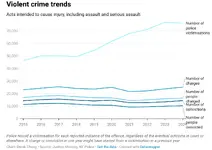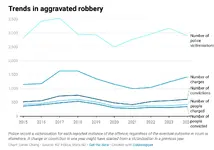View: https://www.instagram.com/reel/DITBRniJL1b/?igsh=MWZsNXpobXVwdHl0eg==
poor old seymour, he’s had a tough week.
Last edited:
Follow along with the video below to see how to install our site as a web app on your home screen.
Note: This feature may not be available in some browsers.
3 strikes - death penaltyStuff
www.stuff.co.nz
Would like to see banks and government work together to really punish these sorts in the most extreme way possible. Cruel bastards
Would rather see a situation where the victim stands to gain some monetary recoup some how? The perpetrators could have any possessions of value be sold to go to the victims or if nothing of value is in their possession, perhaps a working situation where a portion of their wage goes to the victim until that value is met3 strikes - death penalty
Sort of like prostitution? Just pay for the services usedWould rather see a situation where the victim stands to gain some monetary recoup some how? The perpetrators could have any possessions of value be sold to go to the victims or if nothing of value is in their possession, perhaps a working situation where a portion of their wage goes to the victim until that value is met
Certainly needs to be incorporated somehow into the punishment with many never having their money recuperated, or at least often a small portion of the money returned. A retiree is totally dependent on those funds to survive in their retirement, so the consequences of the theft is huge to their day to day survival depending on their financial situation. Living off their super is often unrealistic. Sometimes too the naivety shown to allow this to happen is bewildering with details passed on willinglySort of like prostitution? Just pay for the services used
Don’t know if that’s the best for risk vs reward…


She seems to be undecided about which foot she puts in her mouth so tries both. The Greens are in a bit of a mess aren't they.Stuff
www.stuff.co.nz

Exclusive poll reveals more Green voters feel safer seeing police than ‘less safe’
The majority of Kiwis feel 'more safe' with officers on the beat.www.nzherald.co.nz
gotta try stay relevant now slimy seymour’s whole te tiriti debacle is over and done with as the prime minister said it would be from day one i suppose.
why anyone would give her money is beyond me though.
absolute shitshow.Greens are in a bit of a mess aren't they.
they’re also doing a lot of stuff as far as international payments go sanction wise. (russia belarus and ukraine) not sure if it’ll quite make the news but a lot is happening there at the momentANZ have blinked first and dropped their 6, 12 and 18 month mortgage rates.

not pointed at you man, more a reply to the article.
New Zealand’s divisive treaty principles bill has been defeated – but the fight against populism isn’t over | Chris Finlayson
The damage caused by the treaty bill to Māori relations will take time to repair and debate over the issue may spill into next year’s election campaignwww.theguardian.com
I thought it was an interesting perspective ftom chris finlayson, a national mp i didn’t mindnot pointed at you man, more a reply to the article.
the bill itself caused a lot less division than the politicians who chose to weaponise it did.
it was never going through, we knew that for the last 18 months.
those who used it to plan marches and protests etc are just as guilty as seymour is for the division.
he’s a smarmy little cunt. we all know that, but he’s making his opposition look worse and worse by the week.
greens and TPM have been so busy complaining about the nothing it was, that they’ve spent half the entire term on that, unsuccessfully freeing palestine and little else.



As any teacher or parent knows, the threat of consequences has as much impact as an actual punishment.I find this amazing…. a politician who is actually not giving the government all the credit for a reduction is the crime figures…. how refreshing!!!
ANALYSIS: The dramatic fall in victims of violent crime, and the impact of the Government’s ‘vibe’ rather than its policies
It’s a general rule of politics that governments claim credit when things are going well, and blame others (especially the previous Government) when they don’t.
But Justice Minister Paul Goldsmith was curiously cautious in an interview with the Herald last week, when he was talking up the Government’s success in restoring law and order.
Asked about factors independent of the Government’s agenda, he said: “We’re definitely contributing to it in the effort that we’re making, but I’m not so arrogant to think that the world revolves around what happens in the Beehive. There are broader factors.”
The drop in serious youth offending since the middle of last year, for example, started before many of the Government’s key policies to tackle youth crime were implemented. Youth advocates speculate that the number of serious repeat youth offenders spiked following the increased isolation and stress of the Covid pandemic, and has started reverting to the downward pre-pandemic trend.
A downward pre-pandemic trend was also apparent in general crime statistics, so reversion to this might also be a factor in the 28,000 fewer adult victims of violent crime in the year to February, compared to the year to October 2023.
This is understandably a success the Government is keen to highlight; it smashes the public service target of 20,000 fewer such victims by 2029.
Announcing it yesterday, Police Minister Mark Mitchell acknowledged the work of Corrections and police (noting a 40% increase in police foot patrolling), but also paid tribute to wider efforts including from ethnic communities and the general public.
Goldsmith didn’t mention broader factors. He said it showed “our work to restore law and order is paying off”, citing anti-gang legislation, the return of Three Strikes, limiting sentencing discounts, and scrapping state funding for cultural reports.
Prime Minister Christopher Luxon added that the new tools for police to fight gangs were already “unearthing illegal guns and illegal drugs”.
This was meant to be enabled through police searching the private homes of gang members under a gang patch prohibition order.
Trouble is, no such orders have been issued.
Then there’s Three strikes 2.0, which doesn’t commence until mid-June.
And the Government’s sentencing reforms don’t start until the end of June.
‘Vibe is important’
No state funding for cultural reports, however, has been in place since March last year. The reports led to an average of a 10% sentencing discount, according to Justice Ministry analysis.
It’s possible - though seems unlikely - that this has played a major role in dramatically lowering the number of victims of violent crime in less than a year.
There’d need to be a significant number of violent offenders serving longer prison sentences due to an inability to fund cultural reports. And those longer sentences would need to have prevented enough violent offending to filter through to the number of victims.
Goldsmith seemed to acknowledge this unlikelihood last week, when he told the Herald that the message was as important as the actual policy.
“It was a signal: rather than this culture of excuses about why you do things, actually, people have to be held personally responsible.”
He was responding to a Herald article about changes made in 2016 by the previous National-led Government, which provided stronger safeguards for community sentences. This led to the shorter and fewer prison sentences Goldsmith was blaming Labour for.
“It’s one of the contributing factors,” Goldsmith conceded.
“I think by far a very significant contributing factor is the shift in Government direction right across the whole board, which was [under Labour], we want fewer people in prison, and lo and behold there were fewer people in prison.
“Vibe is important. It filters its way through. We changed the message.”
Asked about this, former District Court Judge David Harvey said he never felt any vibe from the Labour Government telling him to be more lenient in his sentencing.
“I don’t think any judge would consciously think, ‘Oh, the Government has said we’ve got to reduce prison numbers. Therefore, I’m not going to sentence this guy to jail.’
“You deal with the case that’s before you on the basis of the law. You don’t deal with it on the basis of some mysterious vibe that’s come from Wellington,” said Harvey, who retired in 2016 but returned to the bench under an acting warrant from 2018 to 2021.
Nor was it something that could be measured, he added.
“There isn’t a vibe-o-meter at the door of the judge’s chambers that detects the message from the politicians, and influences accordingly.
“It’s probably nice to think that judges take some notice of what politicians say, but no, the oath is to do right to all men according to the laws and usages of New Zealand, and that’s what you do.”
What the data says
This doesn’t necessarily mean the Government’s policies - or its vibe - have had little or no impact on reducing crime.
And it appears to be reducing.
The number of victims of violent crime dropped from a peak of 215,000 in the year to June 2024 to 157,000 for the year to February 2025 - a 27% fall. There were 12,000 fewer victims in Auckland, while in Canterbury there were 5000 fewer victims.
These statistics are from the NZ Crime and Victims Survey, which is considered more robust because it includes the vast majority of crime that goes unreported.
View attachment 12572
But there are also downward trends in police victimisation data - a report of a crime to police, regardless of whether it leads to any charges.
The number of police victimisation reports dropped in 2024 for “acts intended to cause injury” (which covers assault and serious assault), and for aggravated robbery.
This followed year-on-year increases in both categories, which led to an increasing number of annual charges and convictions in court.
Luxon yesterday also mentioned a drop in ram raids, though he didn’t mention that these peaked in mid-2022, well before he took office.
View attachment 12573
In his statement yesterday, at least Goldsmith acknowledged that the numbers are inherently volatile.
But he couldn’t resist the general rule in politics, suggesting any future rise in the number of victims would be Labour’s fault.
“It’s important to remember this survey covers a 24-month period, so we will continue to see the results of Labour’s soft-on-crime approach filter through at points.”

The drop in victims of violent crime, impact of Govt’s ‘vibe’ rather than its policies
Luxon has reached his target for reducing victims of violent crime four years early.www.nzherald.co.nz